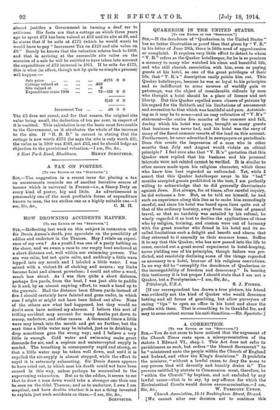HOW DROWNING ACCIDENTS HAPPEN.
[To THE EDITOR ON THE " SPECTATOR."] Sias—Reflecting last week on this subject in connexion with Sir Denis Anson's death, you speculate on the possibility of eddies and undertow in the Thames. May I relate an experi- ence of my own ? As a youth I was one of a party bathing on the shore, and we swam a race to our empty boat anchored at a short distance out, well within our swimming powers. The sea was calm, but not quite calm, and suddenly a little wave lopped into my mouth and I inhaled a little water. I was seized with a violent fit of choking and nausea ; my limbs became faint and almost powerless; I could not utter a word, much less shout. As I was then quite a short distance, perhaps five yards, from the boat, I was just able to paddle to it and, by an almost expiring effort, to reach a hand up to the gunwale. Had the distance been fifteen yards instead of five I should certainly have fainted and gone under, in which case I might or might not have been fished out alive. None of the others saw what had happened, but they would no doubt soon have noticed my absence. I believe this sort of trifling accident may account for many deaths put down to cramp, undertow, and other causes. A thousand times a little wave may break into the mouth and get no further, but the next time a little water may be inhaled, just as in drinking a drop sometimes goes the wrong way; and I believe a very little is enough. Cold water and swimming make great demands for air, and a copious and uninterrupted supply is needed. The breathing is consequently rapid and strong, so that a little water may be taken well down, and until it is expelled the air-supply is almost stopped, while the effort to expel it is extremely exhausting. Sir Denis Anson appears to have cried out, in which case his death could not have been caused in this way, unless perhaps be succumbed to the supervening exhaustion. But as to the eddies, it seems to me that to draw a man down would take a stronger one than can be seen on the tidal Thames; and as to undertow, I own I am sceptical, and have doubts whether it is not a thing invented to explain just such accidents as these.—I am, Sir, &c.,
SCEPTICUS.










































 Previous page
Previous page